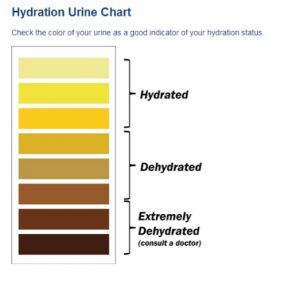Summer alert: Are you hydrating enough? (Probably not!)
Summertime means more times outdoors in the fun and sun – whether it’s attacking the lawn and weeding the garden or hiking a trail and chasing your kids. And, for employers, summer means having to watch employees on the job site that can easily dehydrate and overheat while working in the summer sun and temperatures.
With all that sunshine and sweat, it’s easy to forget about all the fluids you, your family or your employees are losing just by being out in the sun and heat.
Dehydration can happen quickly – in fact, if you are thirsty, you are already dehydrated! Here are some signs to watch for to tell if you are getting dehydrated:
- Dry mouth: This is the sister symptom to thirst. When your mouth gets dry and sticky, start drinking water immediately. Your mouth is made up of mostly fluids, and your body pulls from this area to compensate for fluid loss elsewhere.
- Headaches and dizziness: Your blood is made up of lots of different parts, but it is primarily water. And, the less water you have, the less water your blood has to move all around your circulatory system. So, if you start notice you’re getting a headache or you notice dizziness, it could mean that your blood pressure is lowering due to dehydration. Another thing to watch for in relation to this is a racing, rapid heartbeat. That could mean your heart is pumping faster to compensate for having less blood.
- Lack of sweat or dry and cool skin: If you are working up a sweat while out in the heat, you are certainly losing fluids, which need to be replaced as soon as you can. However, when you notice that you actually have stopped sweating or your skin is getting cool you are dehydrated.
- Color or frequency of urine. The color of your urine is an excellent gauge to your health. If it is dark yellow, you are dehydrated. In a general sense, the lighter the color of your urine, the better. And, you should be peeing every couple of hours, at the least. If you are going more than 12 hours, ever, without peeing, you are definitely dehydrated. Your urine should be pale yellow, and the more water you drink, the paler it should become.

The Mayo Clinic estimates that men need 3 liters of water every day and women need 2.2 liters. And, this number increases dramatically if you are in strenuous activities in the outdoor heat. Sure, we all want to stay hydrated, but getting the recommended amount of water is a challenge when factoring in all the other things to do each day. Here are some simple ways to add water into your daily life that will make that hydration goal a little easier to meet:
- Have a water bottle with you at all times. It’s likely you know where your phone, keys and wallet are right now. Most likely, they are within your reach. Add a water bottle to this list of daily must-haves. If you have an easily accessible source of water near you all day long, you’ll be amazed how much more water you drink.
- Need a break? Can’t solve a problem? Frazzled by something? Drink a glass of water! Many people take coffee breaks or smoke breaks for a mental refresher during the day. Instead, drink an entire glass of water. This will not only help keep you hydrating, but studies have shown that flooding your body with 8 ounces (or more) of water helps people feel more alert. This will wake you up, get you mentally alert again – and it’s healthy for you too!
- Coffee in the morning – start with water instead. Coffee is a diuretic, meaning it actually pulls fluids from your body. While it helps get the day going, it might not be the best for you if you are prone to or fighting dehydration. Instead, drink 8-to-16 ounces of water to begin your day. At the very least, drink this amount of water BEFORE you drink coffee. Then, if you drink more than one cup, drink one glass of water for every cup of coffee you have.
- Eat foods filled with water. Drinking water isn’t the only way to fill up on fluids. In fact, 20 percent of your fluid intake should come from the food you eat. Eat water-filled, and nutrient-rich, foods like fruits, vegetables, yogurts and milk. And, no surprise, stay aware from highly processed foods that contain little water and will just make you thirsty.
- Hydrate the night before. If you know you are not hydrating enough, or you know you will be doing strenuous activities the next day, increase your fluid intake the night before. If you are going to be participating in a race or other athletic endeavor, increase your fluid intake up to 100 percent during the evening before your event.
- Stay away from alcohol. Consuming alcohol lowers your body’s ability to absorb water, and it causes your body to lose more fluid than normal through increased urination. So, in an effort to combat dehydration, work to avoid alcohol. If you do drink alcohol, match every drink you have with a full glass of water to help keep you hydrated.
Stay cool and stay hydrated during this hot season of the year. Having to recover – or having employees that have to miss days for dehydration issues – is more difficult than the simple steps it takes to avoid the chance for dehydration to occur. For more tips or to understand the warning signs of dehydration better, talk with your healthcare professional or anyone at Work Health Solutions.

